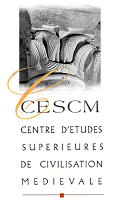
|
29 Mar-2 Apr 2021 CESCM (UMR 7302), Hôtel Berthelot 24, rue de la Chaine TSA 81118, Poitiers (France)
|
Detailed presentationMedievalists Facing Neomedievalisms : Rejection, Support, or Appropriation? The Middle Ages are alive. Our contemporaries constantly recreate it: historical novel, television series, comic strip, village festival, political propaganda... To designate this reappropriation, so far removed from their academic practices, researchers have coined the word “neomedievalism”, which they oppose to “medievism”, that is to say their own methodical analysis of documentary sources and the discourse of scientific type that follows. However, one cannot ignore the free adaptation for artistic or even, more problematically perhaps, for ideological purposes, by which all newcomers can interfere in this field of learning. Most medievalists are aware that the “referential contract” that they enter into with their listeners or readers – too often their own colleagues but few outside of academia – is distinguished from the “fictional contract” established between a large audience and the novelist, screenwriter or director. They are therefore not afraid to have their approach mixed up with that of the creator. Similarly, professional historians appreciate that neomedievalism attracts enlightened amateurs to their discipline and that it arouses new vocations. Besides, didn’t J.R.R. Tolkien, the father of fantasy, or Umberto Ecco, author of a thrilling novel with planetary resonance, deeply belong to their milieu? Finally, experimental archaeology, which has made so much for the progress of the knowledge of the gestures of work and the material life of medieval people, often overlaps with tourist attraction, as evidenced by the current craze for the castle of Guédelon (France). At a time when the dissemination of research is needed more than ever, should neomedievalists step out of their ivory tower to address non-specialists in an educational way? Their field of learning cannot become their preserve. The bridges stretched between "medievalism" and "neomedievalism" do not, however, prevent them from fighting the political instrumentalization of the Middle Ages, which is more and more significant each day. This (mis)appropriation of the past is almost always assimilated to the so-called "clash of civilizations", where Templars and other self-proclaimed Crusaders cross swords with Muslims, the most extreme of whom are tempted by the return to the blessed, rigorous, and austere times of the prophet and of its fighters. More innocent seem to be the festivals and other shows where the medieval era becomes a mocking and saucy carnival. This playful representation is opposed to another one, equally simplistic, painting the Middle Ages as a time of obscurantism, oppression and cruel barbarism. The social demand for medieval history is pressing. It is spread through a "Middle Ages fashion", perceptible in the media, whether it be in the TV series Kaamelott or in the entrance of Georges Duby's work in La Pléiade edition. This interest sometimes crystallizes in the implication of (neo)medievalists in cultural and artistic projects, to enrich a script, correct a novel or write a comic strip. Should we reject these non-specialists on the ground that their reconstructions would violate the rules of our discipline? If need be, the question proves how important it is to organize a major international congress in France to discuss neomedievalism, a subject frequently questioned in other countries and in particular in the United States. The stakes of this new field of knowledge are essential, because the reception of the Middle Ages by our fellow-citizens conditions the social recognition of neomedievalists as scientists and, consequently, the survival of our disciplines in a democratic world. |
| Online user: 2 | Privacy |

|
